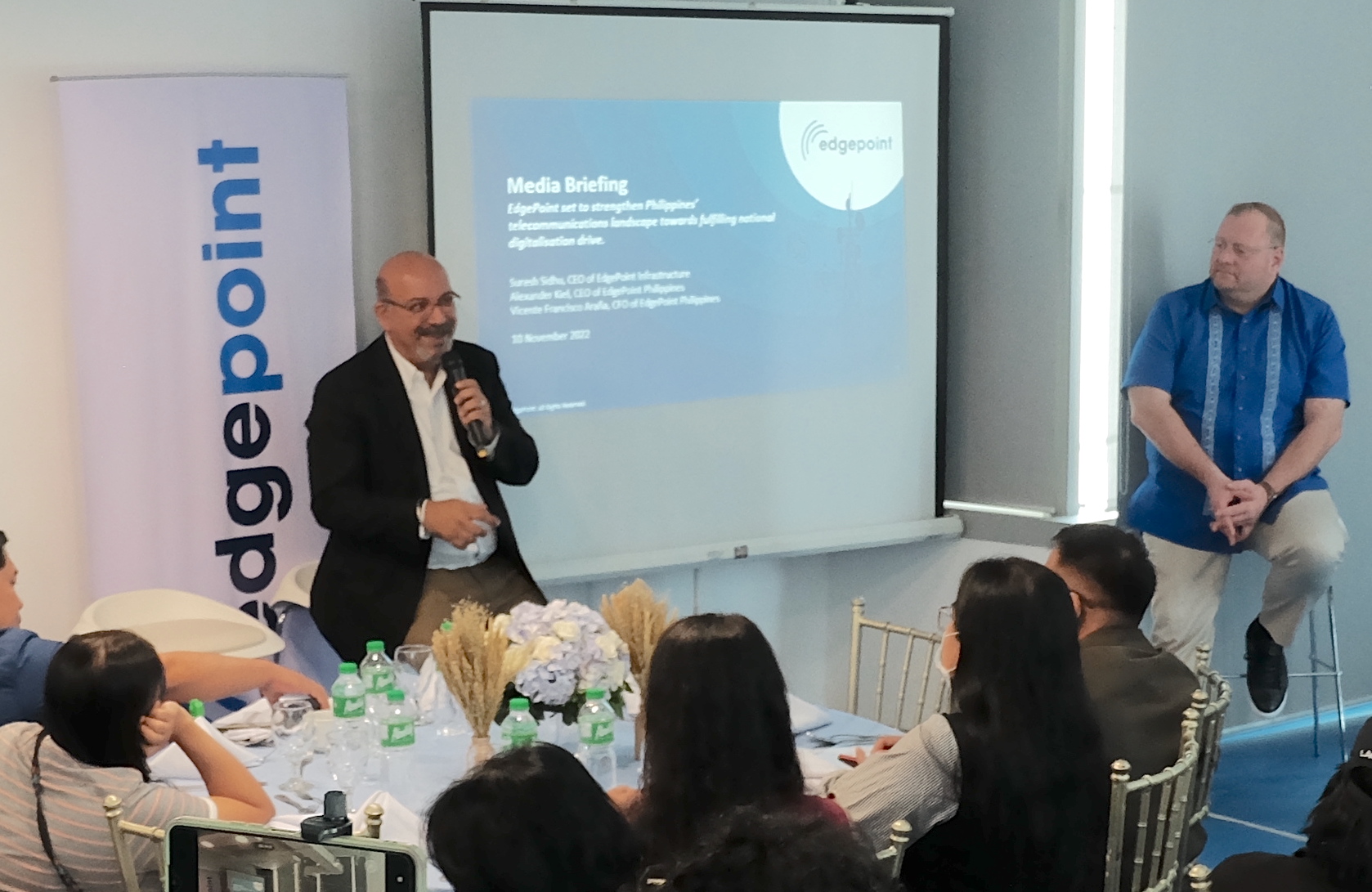EdgePoint Infrastructure (“EdgePoint”), a leading ASEAN-based independent telecommunications infrastructure company, via its subsidiary, Edgepoint Towers Inc. (“EdgePoint Philippines”) is expanding options for telecommunications service providers in the country, in line with the Department of Information and Communications Technology (DICT)’s Policy on Shared Passive Telecommunications Tower Infrastructure (also known as the Common Towers policy) that aims to strengthen communications services and digitalisation in the Philippines. In a briefing session in EdgePoint Philippines’ new headquarters here today, media representatives heard from Suresh Sidhu, Chief Executive Officer of EdgePoint Infrastructure and Alexander Kiel, Chief Executive Officer of EdgePoint Philippines on the company’s capacity to contribute to the country’s telecommunications industry, as an independent towerco.
EdgePoint Philippines officially entered the Philippine market in April this year, through a Sale & Leaseback agreement for 2,934 towers in the Luzon Island group, with Smart Communications Inc (“Smart”) and Digitel Mobile Philippines, Inc. (“DMPI”), both wholly-owned wireless communications and digital services subsidiaries of PLDT Inc. Following the sale, Smart is leasing the towers from EdgePoint Philippines to serve its mobile communications and high-speed internet connectivity needs in the region. The official handover of all towers is expected to be completed in the first half of 2023. To date, 2232 tower sites have been handed over to EdgePoint Philippines.

Speaking at the event Sidhu said “Our market position as an independent towerco aligns well with the DICT’s Common Towers policy that seeks to enhance connectivity while easing mobile network operators from the heavy capital expenditure required for building communications towers, allowing them to focus on improving services and reaching more underserved areas. The number of internet users in the Philippines has more than tripled in the past decade from 23 million in 2010 to 76 million in 2022 and significant investments are needed to meet the demands of this growth. Philippines has a dense number of users per tower which affects overall user experience and the country needs a large number of new towers built to fill this gap. EdgePoint is ready to bring investment, innovation, best practices and expertise into the Philippines to address the nation’s connectivity needs. We are focused on driving the deployment of world class connectivity solutions in the telecommunications landscapes across our footprint, and being the leading 5G enabler for our mobile network operators”.
Kiel added that while EdgePoint Philippines has been focused on deploying the right shared infrastructure for mobile network operators, they are also committed to optimising the vast local experience available to drive growth in the country. “We want to be a part of the future of telecommunications in the Philippines, as we enhance connectivity in the country, we want to also develop the ecosystem, create new job opportunities and introduce green solutions and practices. Since we entered the market, we have created more than 100 new jobs directly and more than 1000 indirectly, and we expect to double this number by end of 2024. As we bring our regional best practices to the country, we plan to leverage the strengths of our local network of vendors, which has grown significantly since we started. Our role as nation building partners go beyond telecommunications infrastructure, as we commit to strengthening the economy by building a reliable supply chain of local vendors and suppliers. The recent pandemic has shown us the importance of self-sufficiency within the industry and we hope to create an ecosystem that can operate independently from other countries and markets”.
Supporting the country’s recently announced National Broadband Plan (NBP) Kiel said “In the Philippines, there is an average of 4,090 users per tower, with mobile download speeds of 22.5 Mbps. The Philippines has historically lagged in ASEAN but we are now seeing much needed policy reforms and new investments for infrastructure, in line with the government’s push to ensure that all Filipinos have access to broadband capability. EdgePoint’s capabilities are in line with the NBP, and we are committed to partnering with the Government in deploying not only the right infrastructure towards ensuring universal, faster and affordable internet access but also in introducing sustainable and environmentally friendly solutions. We will start rolling out our first trial sites featuring a mix of renewable energy and efficient generators in 2023 and target to increase the roll-out of these sites upon successful completion of the trials. We believe these energy efficient solutions are important not only from an environmental perspective but also in bridging the digital divide as it allows us to increase the reach of our communication networks into areas which are currently underserved”.
Sidhu added that one of EdgePoint’s key strategies is to always bring its regional best practices to local markets in which they operate. “Our capacity for building leading-edge telecom structures, providing next generation solutions as well as introducing green technology and sustainable solutions give us an edge in meeting the needs of mobile network operators in the country. We are confident that a more comprehensive and modern communications infrastructure will support the Government’s drive to transform the Philippines into a globally competitive, digitally-enabled economy in line with the Digital Cities 2025 plan”
The Digital Cities 2025 initiative aims to drive inclusive growth in the countryside by transforming high potential areas into bustling IT and Business Process Management (IT-BPM) hubs to grow the Philippine economy within the next five years.
EdgePoint is focused on building and leasing shareable, fibre-integrated, and leading-edge telecom structures as well as providing solutions such as small cells and in-building systems. The company aims to be an industry leader through scale and innovation, driving operational efficiencies through the adoption of analytics and digital technologies. Its capabilities beyond towers includes designing, building, operating and maintaining private networks, edge computing, open RAN, small cells and IBC solutions.
For more information on EdgePoint, please visit https://edgepointinfra.com/



